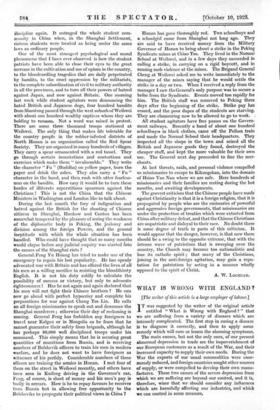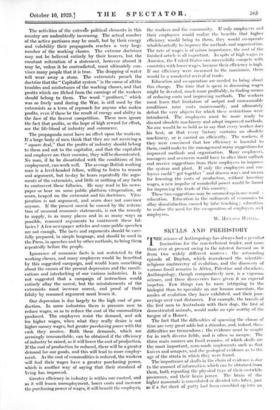1 T was suggested by the writer of the original article
entitled " What is Wrong with England ? " that we are suffering from a variety of diseases which are intensely complicated. The first step in curing a disease is -to diagnose it correctly, and then to apply- some remedy which will cure or lessen the alarming symptoms.'
The main causes, but not the only ones, of our present abnormal depression in trade are the impoverishment of our European customers as a result of the War, and their increased capacity to supply their own needs. During the War the exports -of our -usual- commodities were enor, mously reduced, and foreign countries sought other sources of supply, or were compelled to develop their own manu- factures. These two causes of the severe depression from which we are suffering are beyond our control, and it is, therefore, wiser- that we- should consider any influences which are harmfully affecting our industries, and which we can control in some measure. The activities of the extreme political elements in this country are undoubtedly increasing. The actual number of the active partisans may be small, but by their energy and volubility their propaganda reaches a very large number of the working classes. The extreme doctrines may not be believed entirely by their hearers, but the constant reiteration of a statement, however absurd it may be, unless it be contradicted, must ultimately con- vince many people that it is true. The dropping of water will wear away a stone. The extremists preach the doctrine that the " Capitalist system " is the cause of all the troubles and misfortunes of the working classes, and that profits which are filched from the earnings of the workers should belong to them. _ The word ." profiteer," which was so freely used during the War, is still used by the extremists as a term of reproach for anyone who makes profits, even if these be the result of energy and ability in the face of the fiercest competition. These men ignore the fact that profits, or the hope of high reward for effort, are the lifeblood of industry and commerce.
The propaganda must have an effect upon the workers. If a large body of men think that they are not receiving a " square deal," that the profits of induStry should belong to them and not to the capitalist, and that the capitalist and employer are their enemies, they will be discontented. No man, if he be dissatisfied with the conditions of his employment, can work well. The average British working man is a level-headed fellow, willing to listen to reason and argument, but to-day he hears repeatedly the argu- ments of the. extremists, and little or nothing of any facts to controvert these fallacies. He may read in his news- paper or hear on some public platform vituperation, 'or scorn, heaped on the extremist and his doctrines. Vitu- peration is not argument, and scorn does not convince anyone. If the present unrest be caused by the reitera- tion of unsound economic statements, is not the remedy to supply, in as many places and in as many ways as possible, reasoned arguments to controvert these fal- lacies ? A few newspaper articles and some public speeches are not enough. The facts and arguments should be care- fully prepared, in simple language, and should be used in the Press, in speeches and by other methods, to bring them repeatedly before the people.
Ignorance of economic facts is not restricted to the working classes, and many employers would be benefited by this suggested campaign, and would learn something about the causes of the present depression and the ramifi-, cations and interlocking of our various industries. It is not suggested that a campaign of instruction would entirely allay the unrest, but the misstatements of the extremists must increase unrest, and proof of their falsity by reasoned argument must lessen it.
Our depression is due largely to the high cost of pro- duction. In some industries there is pressure now to reduce wages, so as to reduce the cost of the commodities produced. The employees resist the demand, and ask for higher wages, when what they really desire is not' higher money wages, but greater purchasing power with the cash they receive. Both these demands, which are seemingly irreconcilable, can be obtained if the efficiency of industry be raised, as it will lower the cost of production. If the cost of production be reduced, there will be a greater demand for our goods, and this will lead to more employ- ment. As the cost of commodities is reduced, the workers will find their wages have a greater purchasing power, which is another way of saying that their standard of living has improved.
Greater efficiency in industry is within our control, and as it will lessen unemployment, lower costs and increase the purchasing power of wages, it will benefit the employer, the workers and the community. If only employers and their employees would realize the benefits that higher efficiency would bring to them, they would co-operate wholeheartedly to improve the methods and organization. The rate of wages is of minor importance, the cost of the . finished article is all important. In spite of high wages in America, the United States can successfully compete with countries with lower wages, because their efficiency is high. If our efficiency were increased to the maximum, there would be a wonderful revival of trade.
Education and co-operation are needed to bring about this change. The time that' is spent in discussing wages might be devoted, much more profitably, to finding means . of reducing costs and improving methods. The workers must learn that limitation of output and unreasonable conditions raise costs unnecessarily, and ultimately defeat the very objects for which these restrictions were introduced. The employers must be more ready to discard obsolete machinery and adopt improved methods. No one would be so bold as to say that every worker does his best, or that every factory contains no obsolete machinery, or is carried on efficiently. The workers, if they were convinced that low efficiency is harmful to them, could make to the management many suggestions for improved methods and organization. Many employers, managers and overseers would have to alter their outlook and receive suggestions from their employees to improve the system and plant. If only the employers and em- loyees could " get together " and discuss ways and means for lowering the costs of production, without lowering wages, a new impulse of wonderful power would be found for improving the trade of this country.
These two suggestions may be summed up in one word -- education. Education in the rudiments of economics to allay dissatisfaction caused by false teaching ; education to realize the need for the co-operation of employers aid employees.



























































 Previous page
Previous page